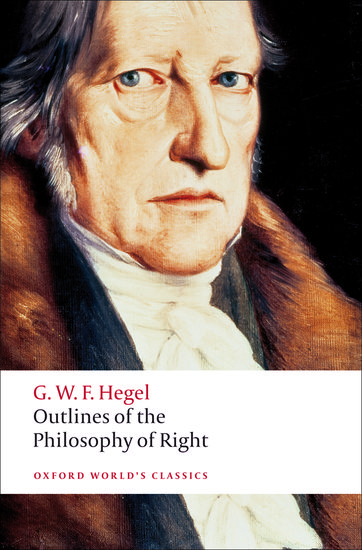Georg Wilhelm Friedrich Hegel was born on this day, 27 August, in 1770. Hegel’s Outlines of the Philosophy of Right is one of the greatest works of moral, social, and political philosophy. It contains significant ideas on justice, moral responsibility, family life, economic activity, and the political structure of the state — all matters of profound interest to us today. Here is an extract from Hegel’s thoughts on the family.
Third Part: Ethical Life, Sub-section 1: The Family
158. The family, as the immediate substantiality of spirit, is specifically characterized by love, which is spirit’s feeling of its own unity. Hence in a family, one’s disposition is to have self-consciousness of one’s individuality within this unity as the essentiality that being in and for itself, with the result that one is in it not as an independent person but as a member.
Addition: Love means in general terms the consciousness of my unity with another, so that I am not in isolation by myself but win my self-consciousness only through the renunciation of my independence [Fürsichsein] and through knowing myself as the unity of myself with another and of the other with me. Love, however, is feeling, i.e. ethical life in the form of something natural. In the state, feeling disappears,; there we are conscious of unity as law; there the content must be rational and known to us. The first moment in love is that I do not wish to be a self-subsistent and independent person and that, if I were, then I would feel defective and incomplete. The second moment is that I find myself in another person, that I count for something in the other, while the other in turn comes to count for something in me. Love, therefore is the most tremendous contradiction; the understanding cannot resolve it since there is nothing more stubborn than this point [Punktualität] of self-consciousness which is negated and which nevertheless I ought to possess as affirmative. Love is at once the producing and the resolving of this contradiction. As the resolving of it, love is unity of an ethical type.
159. The right which the individual enjoys thanks to the unity of the family, and which is in the first place simply the individual’s life within this unity, takes on the form of right (as the abstract moment of determinate individuality) only when the family begins to dissolve. At that point those who should be family members both in their disposition and in actuality begin to be self-subsistent persons, and whereas they formerly constituted one specific moment within the whole, they now receive their share separately and so only in an external fashion by way of money, food, educational expenses, and the like.
Addition: The right of the family properly consists in the fact that its substantiality should have determinate existence. Thus it is a right against externality and against secession from the family unity. On the other hand, to repeat, love is a feeling, something subjective, against which unity cannot make itself effective. The demand for unity can be sustained, then, only in relation to such things as are by nature external and not conditioned by feeling.
160. The family is completed in these three phases:
(a) marriage, the form assumed by the concept of the family in its immediate phase;
(b) family property and assets (the external existence of the concept) and attention to these;
(c) the education of children and dissolution of the family.
Georg Wilhelm Friedrich Hegel was a revolutionary German philosopher and leader in German Idealism. His penetrating analysis of the causes of poverty in modern civil society was to be a great influence on Karl Marx. Hegel shows that genuine human freedom does not consist in doing whatever we please, but involves living with others in accordance with publicly recognized rights and laws. He demonstrates that institutions such as the family and the state provide the context in which individuals can flourish and enjoy full freedom. Hegel’s study remains one of the most subtle and perceptive accounts of freedom that we possess, and this newly revised translation makes it more accessible than ever. The Oxford World’s Classics edition of Outlines of the Philosophy of Right incorporates Hegel’s lecture notes within the text and provides a glossary of key terms, up-to-date bibliography, and invaluable notes. The editor, Stephen Houlgate, is a Professor of Philosophy at the University of Warwick and is the author of Hegel, Nietzsche and the Criticism of Metaphysics; An Introduction to Hegel: Freedom, Truth and History; and The Opening of Hegel’s Logic: From Being to Infinity.
For over 100 years Oxford World’s Classics has made available the broadest spectrum of literature from around the globe. Each affordable volume reflects Oxford’s commitment to scholarship, providing the most accurate text plus a wealth of other valuable features, including expert introductions by leading authorities, voluminous notes to clarify the text, up-to-date bibliographies for further study, and much more.
Subscribe to the OUPblog via email or RSS.
Subscribe to only philosophy articles on the OUPblog via email or RSS.
View more about this book on the ![]()
![]()


Recent Comments
There are currently no comments.